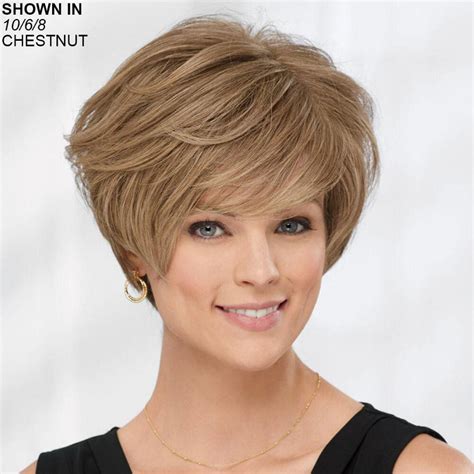Introduction
Aging gracefully often involves embracing the natural changes that come with time. However, for many elderly women, hair loss can be a significant challenge that affects their self-esteem and quality of life. Wigs offer an effective and stylish solution, empowering elderly women to regain their confidence and enhance their appearance.

Types of Wigs for Elderly Women
Wigs for elderly women come in a wide variety of styles, colors, and materials. Here are some of the most popular types:
- Synthetic wigs: Made from synthetic fibers, these wigs are durable, affordable, and easy to style. They come in a variety of colors and textures, making it easy to match the wearer’s natural hair.
- Human hair wigs: Crafted from real human hair, these wigs offer a natural look and feel. They are higher maintenance than synthetic wigs but provide unmatched realism.
- Custom-made wigs: Designed specifically for the individual wearer, custom-made wigs offer the most personalized fit and appearance. They are typically more expensive but ensure a seamless and flawless integration.
Benefits of Wigs for Elderly Women
- Restore hair volume and thickness: Wigs can instantly add volume and coverage to thinning or balding hair, restoring a youthful and natural appearance.
- Mask hair loss: Wigs effectively conceal hair loss caused by age-related factors, medical conditions, or alopecia.
- Enhance facial features: A well-chosen wig can frame the face and highlight the wearer’s best features, creating a flattering and rejuvenating effect.
- Boost self-esteem: Wearing a wig can significantly improve self-confidence and mood by restoring a sense of youthfulness and enhancing personal appearance.
Choosing the Right Wig for Elderly Women
Selecting the right wig for elderly women requires careful consideration of several factors:
- Hair texture and color: Choose a wig that matches the wearer’s natural hair texture and color to ensure a seamless blend.
- Skin tone: Select a wig color that complements the wearer’s skin tone, enhancing their overall appearance.
- Face shape: Different wig styles suit different face shapes. Consult with a wig specialist or stylist to determine the most flattering option.
- Lifestyle and activities: Consider the wig’s maintenance requirements and choose one that aligns with the wearer’s lifestyle and daily activities.
Tips for Elderly Women Wearing Wigs
- Choose a lightweight wig: Elderly women often experience scalp sensitivity, so a lightweight wig that minimizes pressure on the scalp is crucial.
- Secure the wig properly: Use wig grips, adhesive strips, or liner tape to ensure the wig stays securely in place without slipping or causing discomfort.
- Maintain the wig regularly: Clean and condition synthetic wigs according to the manufacturer’s instructions. Human hair wigs require professional maintenance and styling.
- Accessorize with scarves or hats: Scarves or hats can add a touch of style and help protect the wig from environmental damage.
Common Mistakes to Avoid
- Choosing a wig that is too heavy or bulky: This can put strain on the scalp and cause discomfort.
- Not customizing the fit: A poorly fitting wig can slip, shift, or look unnatural.
- Using excessive hairspray or styling products: These products can damage the wig fibers and make them look stiff and unnatural.
- Not taking breaks from wearing the wig: Regular breaks allow the scalp to breathe and prevent irritation.
FAQs
Q: Can elderly women wear wigs all the time?
A: It is not recommended to wear a wig continuously for extended periods. Regular breaks should be taken to allow the scalp to rest and breathe.
Q: How often should elderly women wash their wigs?
A: Synthetic wigs should be cleaned every 6-8 wears, while human hair wigs require more frequent washing, depending on the frequency of use and the wearer’s lifestyle.
Q: Can elderly women with sensitive scalps wear wigs?
A: Yes, many wigs are designed specifically for sensitive scalps, using breathable materials and hypoallergenic adhesives.
Q: Are wigs expensive?
A: The cost of wigs varies depending on the type, materials, and customization options. Synthetic wigs are generally more affordable than human hair wigs.
Conclusion
Wigs offer a practical and stylish solution for elderly women facing hair loss. By carefully choosing and caring for a wig that suits their individual needs, elderly women can restore their confidence, enhance their appearance, and embrace their golden years with grace and style.
